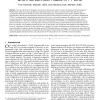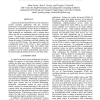84 search results - page 2 / 17 » Designing and testing fault-tolerant techniques for SRAM-bas... |
TC
1998
13 years 5 months ago
1998
—The very high levels of integration and submicron device sizes used in current and emerging VLSI technologies for FPGAs lead to higher occurrences of defects and operational fau...
FPL
2009
Springer
13 years 10 months ago
2009
Springer
Commercial SRAM-based FPGAs have the potential to provide aerospace applications with the necessary performance to meet next-generation mission requirements. However, the suscepti...
DATE
2005
IEEE
13 years 11 months ago
2005
IEEE
Triple Modular Redundancy (TMR) is a suitable fault tolerant technique for SRAM-based FPGA. However, one of the main challenges in achieving 100% robustness in designs protected b...
FPGA
2005
ACM
13 years 11 months ago
2005
ACM
FPGA-based designs are more susceptible to single-event upsets (SEUs) compared to ASIC designs. Soft error rate (SER) estimation is a crucial step in the design of soft error tole...
GLVLSI
2005
IEEE
13 years 11 months ago
2005
IEEE
We develop a novel on-line built-in self-test (BIST) technique for testing FPGAs that has a very high diagnosability even in presence of clustered faults, a fault pattern for whic...


